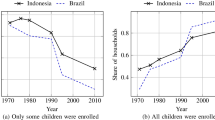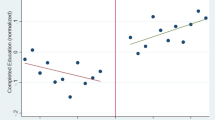Abstract
Main trends are presented on fertility, age of the mother at having her first child, and time that young people spend in fulltime education. Fertility is declining and is now well below the population replacement rate in all European countries. To some extent the fertility decline is caused by postponement of motherhood in the sense that the decline would have been smaller if mothers of successive generations were not getting increasingly old. But why are women and men forming families so late, and what role is played by the extension of formal education?
Similar content being viewed by others
References
Namkee Ahn Pedro Mira (2001) ArticleTitle“Job Bust, Baby Bust?: Evidence from Spain” Journal of Population Economics 14 505–521
Becker, Gary. (1981, 2nd ed. 1994). A Treatise on the Family, Cambridge, MA: Harvard University Press.
Beets, Gijs C.N. (1997). “Kinderen worden later geboren: een demografische analyse.” In Gijs Beets, Antoinette Bouwens, and Joop Schippers (eds.), Uitgesteld ouderschap (Dutch) Amsterdam: Thesis publisher.
Gijs C.N. Beets (1998) ArticleTitleOnderwijs en de geboorte van het eerste kind in Europa, FFS gegevens Bevolking en Gezin 27 99–121
John Bongaarts Griffith Feeney (1998) ArticleTitle“On the Quantum and Tempo of Fertility” Population and Development Review 24 271–291
Bongaarts, John. (1999). “Fertility in the Developed World: Where Will it End?” American Economic Review. Papers and Proceedings 256–260.
Willy. Bosveld (1996) The Ageing of Fertility in Europe: A Comparative Demographic-Analytic Study Thesis Publishers PDOD, Amsterdam
Alessandro. Cigno (1991) Economics of the Family Clarendon Press Oxford
Council of Europe. (2001). Recent Demographic Developments in Europe. (http://www.coe.int/t/e/social_cohesion/population/demographic_year_book/2001_Edition/default.asp#TopOfPage).
John Ermisch (2003) An Economic Analysis of the Family Princeton University Press Princeton
European Commission. (1995). Structures of the Education and Initial Training Systems in the European Union http://europa.eu.int/comm./education/struct/struct.html.
Shoshana Grossbard-Shechtman (1993) On the Economics of Marriage Westview Press Boulder, CO
Siv Gustafsson (2001) ArticleTitle“Optimal Age at Motherhood: Theoretical and Empirical Considerations on Postponement of Motherhood in Europe” Journal of Population Economics 14 225–247
Siv Gustafsson Eiko Kenjoh Cecile Wetzels (2002) “The Role of Education on Postponement of Motherhood in Britain, Germany, The Netherlands and Sweden” Angela Elisabetta Ruspini Angela Dale (Eds) The Gender Dimension of Social Change, The Contribution of Dynamic Research to the Study of Women’s Life Courses The Policy Press Bristol, UK
Siv Gustafsson Cecile Wetzels (2000) Optimal Age at First Birth: Germany, Great Britain, the Netherlands and Sweden Siv Gustafsson Danièle Meulders (Eds) Gender and the Labour Market, Econometric Evidence of Obstacles to Achieving Gender Equality MacMillan Press Ltd London
James Heckman J. James R. Walker (1990) ArticleTitle‘‘The Third Birth in Sweden’‘ Journal of Population Economics 3 235–275
Sylvia Ann Hewlett (2003) Baby Hunger, The New Battle for Motherhood Atlantic Books London
Jan M. Hoem (1986) ArticleTitle“The Impact of Education on Modern Family-union Initiation” European Journal of Population 2 113–133
Joseph D. Hotz Jacob Klerman Robert Willis (1997) “The Economics of Fertility in Developed Countries” Mark Rozenzweig Oded Stark (Eds) Handbook of Population and Family Economics, Vol 1A Elsevier Amsterdam
Kenjoh, Eiko. (2004). Balancing Work and Family Life in Japan and Four European Countries. Economic Analysis on Mother’s Employment and Timing of Motherhood, Thela Thesis, dissertation University of Amsterdam, No. 337.
Kohler, Hans-Peter., Francesco C. Billari, and José-Antonio Ortega. (2002). Towards a Theory of Lowest-Low Fertility, Working Paper Max Planck Institute for Demographic Research, Rostock, Germany.
Ron Lesthaeghe Paul Willems (1999) ArticleTitleIs Low Fertility a Temporary Phenomenon in the European Union? Population and Development Review 25 211–228 Occurrence Handle10.1111/j.1728-4457.1999.00211.x
Jacob Mincer (1963) “Market Prices, Opportunity Costs, and Income Effects” Princeton University Press In H. Gregg Lewis (ed.), Aspects of Labor Econonomics, Princeton, NJ
Dimiter Philipov Hans-Peter Kohler (2001) ArticleTitle“Tempo Effects in the Fertility Decline in Eastern Europe: Evidence from Bulgaria, The Czech Republic, Hungary, Poland and Russia” European Journal of Population 17 37–60
Egbert Te Velde Peter L. Pearson (2002) ArticleTitle“The Variability of Female Reproductive Ageing” Human Reproductive update 8 141–154
UNESCO http://europa.eu.int/comm/education/struct/struct.html).
Author information
Authors and Affiliations
Corresponding author
Additional information
JEL Classification: D1, J1
I am grateful for having received useful suggestions for improving this paper from Catalina Amuedo-Dorantes, Sara de la Rica, Shoshana Grossbard, Amaia Iza, Adriaan Kalwij, Eiko Kenjoh, Jean Kimmel, Catherine Sofer, and Seble Worku. I thank Howard Yourow for helping with my English and Robert Helmink and Sebastiene Postma for typing various versions of this paper. All remaining shortcomings are mine.
Rights and permissions
About this article
Cite this article
Gustafsson, S. Having Kids Later. Economic Analyses for Industrialized Countries. Rev Econ Household 3, 5–16 (2005). https://doi.org/10.1007/s11150-004-0977-x
Received:
Accepted:
Issue Date:
DOI: https://doi.org/10.1007/s11150-004-0977-x




